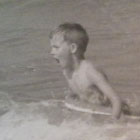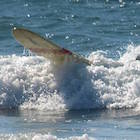Getting through walls of white water
Getting through walls of white water
![]() by will1212 » Wed Jun 07, 2017 3:06 pm
by will1212 » Wed Jun 07, 2017 3:06 pm
I'm looking for some advice about getting through reasonably large recently broken waves.
I recovered about 2 months ago after being out of action for 6 months due to an injury I got being bashed around by white water ( no board involved).I've been surfing around a year, not including the injury.
Today I've just pulled a muscle in my back when my head got yanked to the side while tumbling under a big wave.
I've tried being relaxed or being tensed up and being in a ball but still I'm obviously doing something wrong if I'm getting injuries much more than others in this situation.
I can't duck dive my board, it's 6' 6'' but with a lot of volume. I always turtle roll it fine, but when the wave is particularly big I obviously get slammed under.
Does anyone else have this problem of getting twisted and broken by the waves or do there bodies just take the beating better than mine, or is there anything I can do to prevent this?
Thanks
- will1212
- New Member
- Posts: 5
- Likes: 0 post
- Liked in: 0 post
- Joined: Wed Jun 07, 2017 2:56 pm
Re: Getting through walls of white water
![]() by oldmansurfer » Wed Jun 07, 2017 5:37 pm
by oldmansurfer » Wed Jun 07, 2017 5:37 pm
Then there is a variety of ways to get through the waves if you still get caught. Duck dive and turtle roll but not right where the wave is breaking. The more ways you know the better off you will be. There are many posts here about getting out through the surf if you use the search feature. I think in your case avoiding getting pounded is what you need.
As far as how to deal with the pounding. I think being flexible helps so stretching/yoga helps. Keeping track of where the bottom is and what the wave is doing helps too. If you panic it does not help. I think there were 2 other things that helped me to learn to take a pounding without injury. First is I used to body surf quite a lot before I surfed so I was accustomed to taking a beating from the waves. You take a much worse beating bodysurfing than you do surfing on the same sized waves. The other thing was Judo. Judo teaches you how to fall without getting hurt. If you practice it enough to where you have the reflexes this will help you surfing as well. I still do a judo shoulder roll when I hit the bottom head first surfing
-

oldmansurfer - Surf God
- Posts: 8192
- Likes: 0 post
- Liked in: 0 post
- Joined: Mon Aug 12, 2013 9:10 pm
- Location: Kauai
Re: Getting through walls of white water
![]() by waikikikichan » Wed Jun 07, 2017 8:58 pm
by waikikikichan » Wed Jun 07, 2017 8:58 pm
2) Is it a beach break or reef break ?
3) What size board were you riding before the 6'6" ?
4) How's your paddling power/speed ?
My advice if it's not a full beach break dump is to use more "brain" than "brawn". Maybe paddle around, look for the zig zag paths out or even wait inside for the end of the 3-4 wave set. Try not to fight mother nature.
Main thing is to figure out how not to take a beating. Listen to Turtle.
-

waikikikichan - Surf God
- Posts: 4783
- Likes: 0 post
- Liked in: 0 post
- Joined: Mon Sep 01, 2014 11:35 pm
- Location: Tokyo, Japan
Re: Getting through walls of white water
![]() by dtc » Thu Jun 08, 2017 2:02 am
by dtc » Thu Jun 08, 2017 2:02 am
- make sure the nose is under the water
- make sure the board is at a right angle to the white water
- it helps if you are are lined up with the board (ie not to the side of the board), although there are some turtle rolling techniques where you are to the side of the board. But you still need to be lined up in the same direction as the board ie right angle to the white water
And then relax - dont fight the water, its stronger than you. Go with the flow. If you are properly lined up and the nose is under, probably at worst you will be pushed back a bit. But if you arent lined up properly, you will be flipped sideways. If your nose isnt under/under far enough, then the board gets caught and you go with it.
- dtc
- Surf God
- Posts: 3833
- Likes: 0 post
- Liked in: 0 post
- Joined: Mon May 21, 2012 4:58 am
Re: Getting through walls of white water
![]() by Big H » Thu Jun 08, 2017 4:44 am
by Big H » Thu Jun 08, 2017 4:44 am
-

Big H - Surf God
- Posts: 3408
- Likes: 0 post
- Liked in: 0 post
- Joined: Mon Feb 09, 2015 5:40 pm
- Location: Bali
Re: Getting through walls of white water
![]() by will1212 » Thu Jun 08, 2017 9:03 am
by will1212 » Thu Jun 08, 2017 9:03 am
I'm 26 and as all my older friends tell me I shouldn't be getting injured being pounded by waves!!
In regards to trying to paddle round the waves I try, but currently where I'm surfing beach breaks and the biggest channels are often a long long way from where you want to be surfing, so I always try to go for the least intense area near where I want to go. you talk about the serach feature what is this??
I stretch regularly, partilcularly after my last injury and am also doing some core strengthening.
The beech I was surfing on was a beach break where the nearest channel are around a km away.
It wasn't getting out that was the problem. The conditions were pretty good shoulder-chest high non-dumpy waves. It was just that I had surfed one a fair way then a much larger wave came and closed out 20m further back from where I had been sitting inside.
I probably was a little bit lazy turtle rolling because I was thinking about how big the wave was.But more or less I had used the technique above, but the board just got ripped away and I span not head over heals but like a corksrew.
I did relax and that is how my neck got bent sideways and pulled a muscle going down the side of my back, thinking about it it could have been worse.
Is it possible that the main thing I did wrong was not hang on to the board harder to take some of the impact? I spoke to a few of my surfing friends here and they seemed to be saying it was bad luck, but I'm convinced there is something I'm not doing quite right.
- will1212
- New Member
- Posts: 5
- Likes: 0 post
- Liked in: 0 post
- Joined: Wed Jun 07, 2017 2:56 pm
Re: Getting through walls of white water
![]() by will1212 » Thu Jun 08, 2017 9:06 am
by will1212 » Thu Jun 08, 2017 9:06 am
Thanks again for all your replies
- will1212
- New Member
- Posts: 5
- Likes: 0 post
- Liked in: 0 post
- Joined: Wed Jun 07, 2017 2:56 pm
Re: Getting through walls of white water
![]() by dtc » Thu Jun 08, 2017 9:59 am
by dtc » Thu Jun 08, 2017 9:59 am
In this case you just do what you can and hope! Better surfers than you and me have suffered from clean up set waves
- dtc
- Surf God
- Posts: 3833
- Likes: 0 post
- Liked in: 0 post
- Joined: Mon May 21, 2012 4:58 am
Re: Getting through walls of white water
![]() by will1212 » Thu Jun 08, 2017 10:25 am
by will1212 » Thu Jun 08, 2017 10:25 am
I obviously try to never let go of my board when turtle rolling so it's not a damger to others. But in this case, if i'd have hung on for deal life would it have taken a lot of the impact? Because i wasn't sire if that would have been the case or I would have been getting tossed around with a nice hard object to come in contact with as well..
- will1212
- New Member
- Posts: 5
- Likes: 0 post
- Liked in: 0 post
- Joined: Wed Jun 07, 2017 2:56 pm
Re: Getting through walls of white water
![]() by oldmansurfer » Thu Jun 08, 2017 6:07 pm
by oldmansurfer » Thu Jun 08, 2017 6:07 pm
-

oldmansurfer - Surf God
- Posts: 8192
- Likes: 0 post
- Liked in: 0 post
- Joined: Mon Aug 12, 2013 9:10 pm
- Location: Kauai
Re: Getting through walls of white water
![]() by BoMan » Fri Jun 09, 2017 3:40 am
by BoMan » Fri Jun 09, 2017 3:40 am
http://magicseaweed.com/
-

BoMan - SW Pro
- Posts: 1464
- Likes: 0 post
- Liked in: 0 post
- Joined: Sat Nov 21, 2015 12:19 am
- Location: Napa Valley, USA
Re: Getting through walls of white water
![]() by Tudeo » Fri Jun 09, 2017 8:41 am
by Tudeo » Fri Jun 09, 2017 8:41 am
BoMan wrote:You can also use a forecast site like Magic Seaweed to plan your sessions when the surf is manageable.
Euh...
-

Tudeo - SW Pro
- Posts: 838
- Likes: 0 post
- Liked in: 0 post
- Joined: Fri May 08, 2015 6:52 am
- Location: Bali
Re: Getting through walls of white water
![]() by will1212 » Fri Jun 09, 2017 9:19 am
by will1212 » Fri Jun 09, 2017 9:19 am
Where I live in northern Spain we don't really get 6 foot plus in summer. And we don't get swell as consistently in summer as you guys seem to so magic seaweed is a necessity to plan sessions and even your week!!
- will1212
- New Member
- Posts: 5
- Likes: 0 post
- Liked in: 0 post
- Joined: Wed Jun 07, 2017 2:56 pm
Re: Getting through walls of white water
![]() by Millsy82 » Fri Jun 09, 2017 9:46 pm
by Millsy82 » Fri Jun 09, 2017 9:46 pm
I'm good turtle rolling and can roll successfully Up To about 5-6ft if I time it right on the wave. If the wave has recently broken I take an absolute pounding, usually the board gets ripped out of my hands or bounced off my head!
In the end the last time I was out if nobody was near me I dove into the wave and tried to anchor the board. I know that this is pretty much a big no no and if there were people anywhere near I would hold onto my board as best as possible.
I have recently bought a cheap 6ft10, 20 1/2, 2 1/4 or something like that and I took that out in 5-6 ft today and I managed to just about duck dive it although it probably didn't look pretty.
- Millsy82
- Local Hero
- Posts: 135
- Likes: 0 post
- Liked in: 0 post
- Joined: Thu Jul 28, 2016 4:09 pm
Re: Getting through walls of white water
![]() by Millsy82 » Fri Jun 09, 2017 10:03 pm
by Millsy82 » Fri Jun 09, 2017 10:03 pm
The beach I surf at regularly is a nightmare to get out. What I find is I spot the channels but they change really quickly so that channel can soon become where the next set is coming in, so you try and paddle where the channel is but by that time the set has passed and where your paddling to the next set is coming in there.
What I have found that works for me is if I catch the first wave in I have a gentle paddle back and wait for the set to pass then paddle like my life depends on it. The time I find I'm in trouble is if I mess up the 1st wave of a set and then the bigger wave behind breaks right on me!
- Millsy82
- Local Hero
- Posts: 135
- Likes: 0 post
- Liked in: 0 post
- Joined: Thu Jul 28, 2016 4:09 pm
Re: Getting through walls of white water
![]() by waikikikichan » Sat Jun 10, 2017 12:16 am
by waikikikichan » Sat Jun 10, 2017 12:16 am
Millsy82 wrote:I have recently bought a cheap 6ft10, 20 1/2, 2 1/4 or something like that and I took that out in 5-6 ft today and I managed to just about duck dive it although it probably didn't look pretty.
Last month you had problems popping up and nose diving. Now you can duck dive a 6'10" in 5-6ft. beach break ?
-

waikikikichan - Surf God
- Posts: 4783
- Likes: 0 post
- Liked in: 0 post
- Joined: Mon Sep 01, 2014 11:35 pm
- Location: Tokyo, Japan
Re: Getting through walls of white water
![]() by Millsy82 » Sat Jun 10, 2017 8:17 am
by Millsy82 » Sat Jun 10, 2017 8:17 am
waikikikichan wrote:Millsy82 wrote:I have recently bought a cheap 6ft10, 20 1/2, 2 1/4 or something like that and I took that out in 5-6 ft today and I managed to just about duck dive it although it probably didn't look pretty.
Last month you had problems popping up and nose diving. Now you can duck dive a 6'10" in 5-6ft. beach break ?
Not so much popping up but yes the nose would go under for a second or 2. Having listened to advice given on here and have slightly altered my position on the board and bingo only happened maybe once or twice a session max usually when I'm rushing.
My duck dive as I said is probably not the prettiest and it is a struggle (probably a combination of poor technique and big floaty board) but it has got me through 90% of the waves yesterday.
I got my 6'10 board because it was cheap and I could fit it and work from my van at the same time so it was more of a get me out on the water a bit more often but because I've had great fun I am now using that a little more often than I originally thought.
- Millsy82
- Local Hero
- Posts: 135
- Likes: 0 post
- Liked in: 0 post
- Joined: Thu Jul 28, 2016 4:09 pm
Re: Getting through walls of white water
![]() by RobSF » Sat Jun 10, 2017 4:31 pm
by RobSF » Sat Jun 10, 2017 4:31 pm
-

RobSF - Local Hero
- Posts: 149
- Likes: 0 post
- Liked in: 0 post
- Joined: Tue Dec 29, 2015 5:58 pm
- Location: San Francisco
Re: Getting through walls of white water
![]() by oldmansurfer » Sat Jun 10, 2017 7:18 pm
by oldmansurfer » Sat Jun 10, 2017 7:18 pm
-

oldmansurfer - Surf God
- Posts: 8192
- Likes: 0 post
- Liked in: 0 post
- Joined: Mon Aug 12, 2013 9:10 pm
- Location: Kauai
Re: Getting through walls of white water
![]() by dtc » Sun Jun 11, 2017 8:24 am
by dtc » Sun Jun 11, 2017 8:24 am
RobSF wrote:This is one kook's method of dealing with white water, and thus probably to be taken with a grain of salt. First, I'm not a strong swimmer, but I'm about 6' tall, so I often walk as far out as I can before getting on the board to swim. When big white water comes in, I grab the nose of my longboard and squat down and/or swim down low, do my best to let the water go over us. Even if some of the current gets under the board, as long as I'm holding the nose tight, I don't lose control. This is only effective in certain conditions, and if the water's too big or the periods are too short, you get as exhausted doing this as you do turtle rolling or anything else.
I think this is fine as a method ie I do it as well when conditions are right. Maybe we are all kooks.
Two tips
- if you flip the board it's much easier when the white water is a bit bigger, as the rocker does part of the job for you
- wax the nose a little bit (top and bottom). Gives you a much better grip
- dtc
- Surf God
- Posts: 3833
- Likes: 0 post
- Liked in: 0 post
- Joined: Mon May 21, 2012 4:58 am
Similar topics
RELATED: Surf Classifieds: Buy, Sell and Exchange
Author: jandal66
Replies: 2
Latest
-
3 minutes ago by Kulharin2 comments
-
9 days ago by Swimmy Tim5 comments
-
10 days ago by BaNZ3 comments
-
16 days ago by BoMan6 comments
-
19 days ago by hannaconner5 comments
-
1 month ago by BaNZ4 comments
-
1 month ago by HaoleKook4 comments
-
1 month ago by Jimgem2 comments
- The team • Delete all board cookies • All times are UTC


